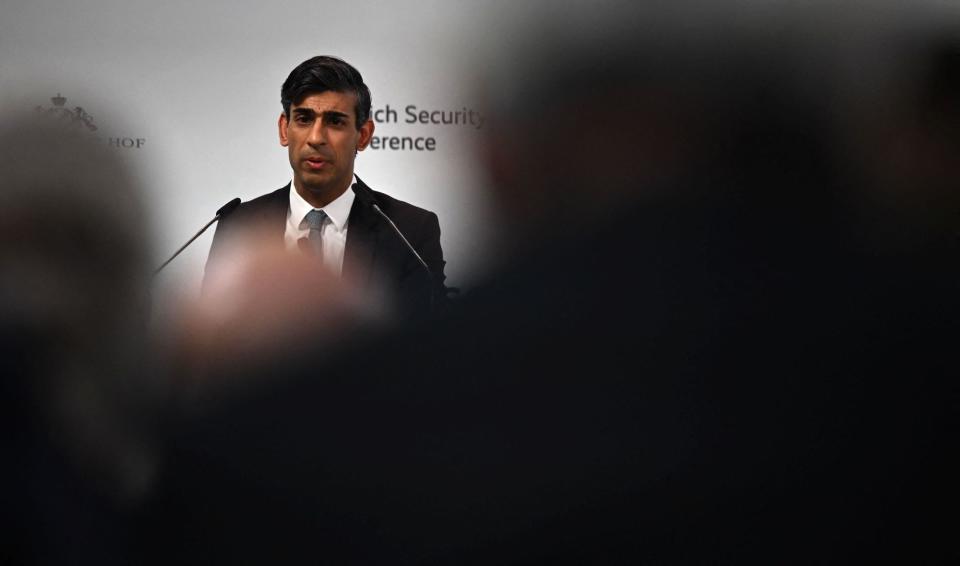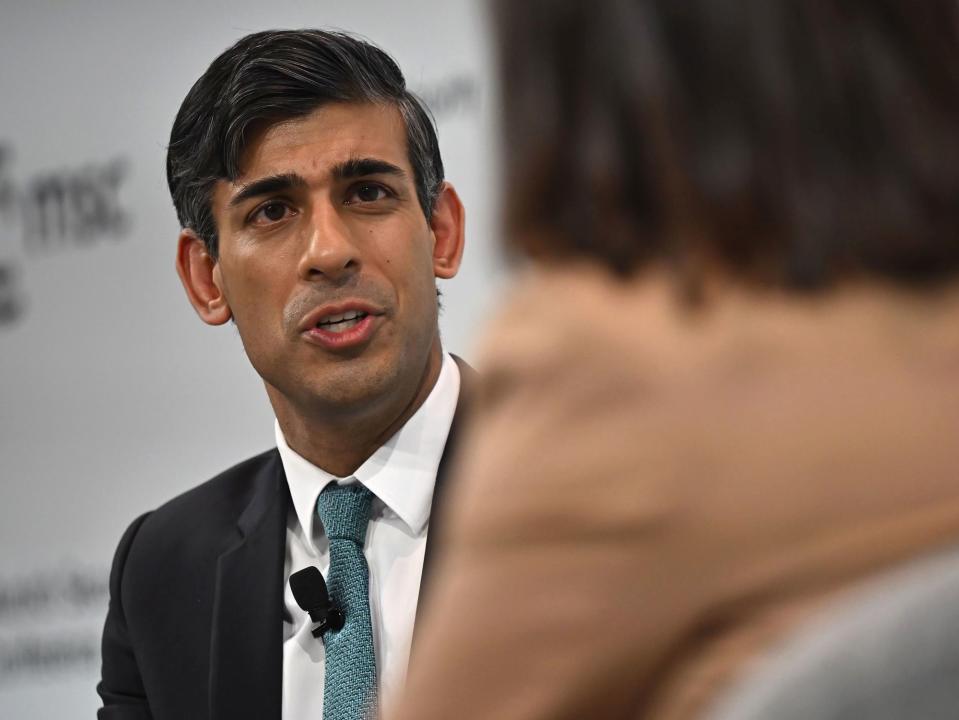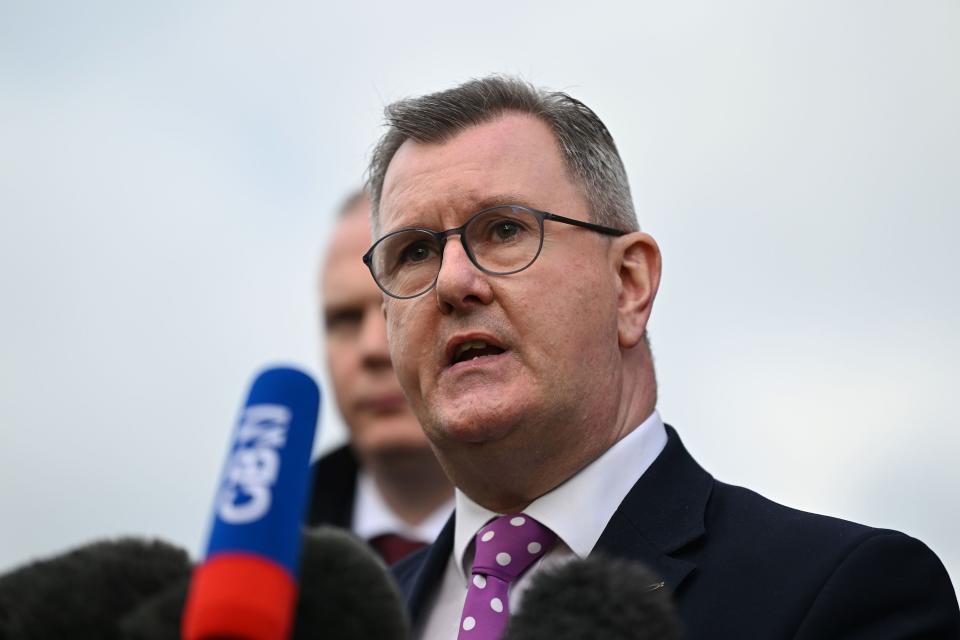Brexit Critics Team Up to Oppose Sunak’s N. Ireland Deal
- Oops!Something went wrong.Please try again later.
(Bloomberg) -- Critics of Rishi Sunak said he had failed to resolve one of the key sticking points in the Brexit negotiations over Northern Ireland, a fresh setback as he tries to convince his own party to back plans to end a long-running dispute with the European Union.
Most Read from Bloomberg
McKinsey Plans to Eliminate About 2,000 Jobs in One of Its Biggest Rounds of Cuts
How Much Do Investors Say They Need to Retire? At Least $3 Million
China Urges State Firms to Drop Big Four Auditors on Data Risk
Russia’s War on Ukraine, China’s Rise Expose US Military Failings
World’s Largest Four-Day Work Week Trial Finds Few Are Going Back
Jeffrey Donaldson, who leads Northern Ireland’s Democratic Unionist Party, a key caucus Sunak is trying to win over, said the UK prime minister’s proposals would still see Northern Irish businesses having to make goods in line with EU regulations — even if they don’t leave Northern Ireland.
“That’s not acceptable,” Donaldson said, after meeting with a hard-line grouping of pro-Brexit Tory MPs, known as the European Research Group, in Westminster on Tuesday evening. “Especially when they’re not selling them to the EU.”
The views of the DUP are important to Sunak because many of his Tory MPs will take their cue on whether to support his EU negotiation based on the DUP’s position. Sunak is currently trying to win over skeptical MPs and prevent the DUP from rejecting his plan outright.
The DUP-ERG meeting was the latest sign of the political obstacles Sunak must overcome if he is to resolve the standoff over Northern Ireland, one of the biggest headaches of his premiership. The UK and EU are close to an agreement that would ease some of the trade frictions in Northern Ireland created by the post-Brexit settlement, but Sunak wants to get his party on board before finalizing the deal.
Earlier, Sunak hosted a cabinet meeting and then met with Conservative backbenchers in a push to resolve the standoff. Sunak told his cabinet that “intensive negotiations with the EU continue on resolving the issues” caused by the existing agreement, according to an emailed readout.
Why Northern Ireland Keeps the UK and Europe at Odds: QuickTake
After long negotiations with the EU, Sunak hasn’t yet shown MPs the final text of any deal, which is a source of frustration for some Conservative backbenchers.
“You can’t ask for the degree of support or otherwise for a deal unless you can actually read what the deal is,” said Tory MP Mark Francois, a member of the ERG, speaking after Tuesday’s meeting. “When we’ve had a chance to do that, we can give you an opinion.”
Also present at Tuesday’s meeting were former Brexit negotiator David Frost and former cabinet ministers Simon Clarke, Jacob Rees-Mogg and John Redwood. Francois said there were 50 people at the meeting, of which about 40 were MPs. If that many Conservative MPs rebelled against Sunak over his deal, he’d need the help of the opposition Labour Party to get it through Parliament - a symbol of weakness he wants to avoid.
The proposed solution in the UK-EU negotiations centers around “green” and “red” customs lanes for goods flowing from Great Britain to Northern Ireland and Europe respectively, which would end onerous checks and paperwork on goods traveling within the UK. However, the role of the European Court of Justice remains a key concern for pro-unionist politicians in Belfast and London, plus the ongoing reach of EU regulations in Northern Ireland.
Even as Sunak wrangles with his own party in London, Foreign Secretary James Cleverly spoke with European Commission Vice-President Maros Sefcovic on Tuesday — the pair’s third conversation in five days. They will speak again in the coming days.
Old Wounds
Sunak is trying to draw a line under a dispute with the EU that has poisoned relations since Britain left the bloc three years ago, amid complaints that the existing Brexit deal hampers trade between the region and Great Britain. The issue is reviving arguments that fatally undermined former Prime Minister Theresa May.
One pro-Brexit Conservative backbencher told Bloomberg they were concerned with the outline of a potential deal shared with them by Downing Street. They will only make a final decision once a final text is available, they said, but needed further reassurances over a consent mechanism in respect of the role of the ECJ in Northern Ireland. The government should not proceed without the support of the DUP, they added.
Rees-Mogg echoed those concerns on a Conservative Home podcast Tuesday, adding: “I don’t know why so much political capital has been spent on something without getting the DUP and the ERG onside first.”
Tory MP Geoffrey Clifton-Brown said skeptics should not derail any deal. “If we don’t accept this deal, we will retain the status quo and not allow the veil to be lifted on the bright future Northern Ireland has ahead of it,” he said in an interview.
Given the ongoing issue of EU regulations applying in Northern Ireland that Sunak is yet to resolve, Clarke said the “preferable” outcome would be for Sunak to push ahead with legislation currently frozen in Parliament, which would give ministers the power to unilaterally override parts of the Brexit agreement concerning the region.
The ERG is not the political force it was at the height of the Brexit wars in Parliament in 2019, with some members now in government and its organizing power diminished, according to people familiar with the government’s thinking.
Irish Prime Minister Leo Varadkar suggested no solution was imminent. At a Dublin briefing with reporters, Varadkar said he “can’t say whether or not we’ll have a protocol agreement this week,” but that a “huge amount of progress has been made.”
Wooing Unionists
Sunak is also trying to persuade the DUP to back his approach in a bid to end its opposition to forming a power-sharing government in Northern Ireland, which has been suspended for more than a year.
Sunak’s spokesman Max Blain told reporters in London on Tuesday that talks with the EU still include “unresolved issues,” and that the government would continue to engage with parties in Northern Ireland.
A person familiar with the government’s strategy suggested not all of the DUP needed to be brought onside for the premier to press ahead with his plans.
Downing Street had been cheered at the end of last week by Donaldson’s apparent optimism, while other members of the unionist party such as Sammy Wilson have since spoken out broadly against the prospect of a deal.
Even so, the party leader Tuesday still sounded a conciliatory note. “I want to commend the prime minister for the work he’s done,” Donaldson said. “Progress has been made. But there’s still some way to go.”
Former Prime Minister Boris Johnson is also a factor. A person close to Johnson said at the weekend that he opposes any move to drop legislation allowing ministers to unilaterally rewrite much of the protocol. That’s a view taken up in recent days by several pro-Brexit MPs.
--With assistance from Peter O'Dwyer and Alex Wickham.
(Updates with details from DUP-ERG meeting from first paragraph.)
Most Read from Bloomberg Businessweek
With Human Metalworkers Hard to Come By, Robotic Blacksmiths Step Up
The Staged Bomb Scare That Backfired on Mumbai’s Notorious Cops
©2023 Bloomberg L.P.




